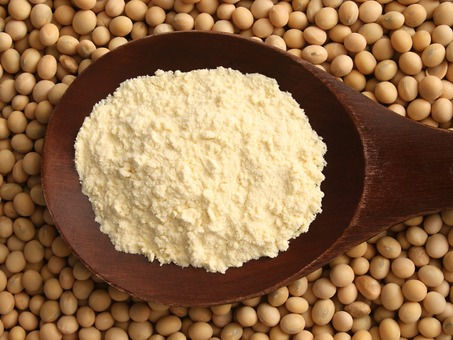Soy protein, known as soy protein, is the protein contained in soy products, which is about 38% or more, four to five times more than cereals. Soy protein is a plant-based protein.
Soy protein is a kind of plant protein, its amino acid composition is similar to milk protein, in addition to methionine is slightly lower, the rest of the essential amino acid content are richer, is a plant-based complete protein. In terms of nutritional value, can be equal to animal protein, in the genetic structure is also the closest to the human body amino acids, so it is the most nutritious plant protein. Soy protein has the incomparable advantages of animal protein, soy protein, although methionine is very little, but does not contain cholesterol, its unique physiological active substances --- isoflavones have the effect of lowering cholesterol. Soybean is one of the main crops in China, because it has both edible oil resources and edible protein resources, has a high nutritional value, soy protein is the most abundant protein in nature, the amino acid composition and the composition of essential amino acids similar to the human body, but also rich in calcium, phosphorus, iron, oligosaccharides and a variety of vitamins, is known as the “gold of growth. Gold”. Industrialized soy protein products include soy protein powder (SF), soy protein concentrate (SPC), soy protein isolate (SPI) and soy tissue protein (TSP).
FAO/WHO (1985) human test results show that the essential amino acid composition of soy protein is more suitable for human needs, for people over two years of age, the physiological efficiency of soy protein is 100. soy is rich in protein, and its protein content is almost twice as much as that of meat, eggs and fish. Moreover, the protein contained in soybeans has sufficient content of “essential amino acids” and complete components, which belongs to “high-quality protein”. The human body's demand for protein varies according to age, gender, weight, job type and so on. In order to guide people's diet, countries around the world combined with the actual situation of their own country respectively formulated the “recommended daily supply of dietary nutrients” In 1999, the U.S. Food and Drug Administration issued a statement: 25 grams of soy protein intake per day, there is a reduction in the risk of cardio-cerebral vascular disease.
There are two types of soy protein products: powdered soy protein products and textured soy protein products.
Powdered soy protein products are soybean as raw material by degreasing, removal or partial removal of carbohydrates and soy protein-rich products, depending on the protein content is different, divided into three kinds: (1) soy protein powder, protein content of 50-65% (dry basis); (2) soy protein concentrate, protein content of 65-90% (dry basis), with soy protein concentrate as raw material by physical modification and obtain the With emulsification, gel and other functions of the product is called functional soybean protein concentrate (3) soybean isolate protein, protein content of 90% (dry basis) or more. Soybeans are rich in protein, its content is wheat, rice and other cereal crops more than twice, usually between 40% and 50%. The storage protein is the main body of soybean protein, accounting for more than 70% of the total protein, including 7S globulin (soybean with globulin) and 11S globulin (soybean globulin), and other storage proteins, such as 2S, 9S, 15S and so on, the content of a smaller amount. In addition to storage proteins, soy protein also contains some biologically active proteins, such as β-amylase, cytochrome c, phytohemagglutinin, lipoxygenase, urease, Kunitz trypsin inhibitor and Bowman-Birk trypsin inhibitor. Often, these inhibitors are removed during processing or inactivated by special means to improve the digestibility of soy products. In addition, isoflavones, saponins and lecithin are usually present in different types of commercially available soy protein products.
In terms of amino acid content, soy protein is the only plant protein reported to contain the nine essential amino acids required by the human body and to meet the human body's needs, and it is recognized as a full-valent protein, with the protein evaluation index PDCAAS (Protein Digestibility Corrected Amino Acid Score) reaching the maximum value of the evaluation, as do casein and egg white.1 From the point of view of amino acid requirement, both for 2% and 2% of the total amino acid requirement, soy protein has the highest amino acid content in the world. In terms of amino acid requirements, the essential amino acid content of soy protein meets the daily requirement of the human body for both preschool children aged 2 to 5 years and adults. However, for infants, the addition of threonine, methionine, lysine and tryptophan in appropriate amounts can increase the potency ratio and net protein ratio of soy protein.
The modern population needs foods that are appetizing, free of adverse side effects, and rich in nutrients. Among the existing food groups, there is no other crop with these conditions and abundant sources of raw materials than soybeans. Drinks made from soy protein are known as “green milk” by nutritionists. Soy protein is effective in reducing high cholesterol in people with high cholesterol. Soy protein drinks in the arginine content than milk, its arginine and lysine ratio is also more reasonable; the lipids, linoleic acid is extremely rich and does not contain cholesterol, can prevent cardiovascular disease in adulthood. Rich lecithin, can remove excess sterols in the blood, “vascular scavenger” reputation.
Soy protein drinks are easier to digest and absorb than milk. Milk into the stomach is easy to form large and hard lumps, while soy milk into the stomach is formed into small slices, and fluffy not hard, can make it easier to digest and absorb. These soy proteins are essential nutrients for everyone, but most of them are insufficient through daily dietary intake and must be supplemented by consuming protein powders, especially for certain special groups such as children, pregnant women, lactating mothers and the elderly.
GNFCHEM is professional Food Additives manufacturer, please follows us and get more products catalogue and price!
